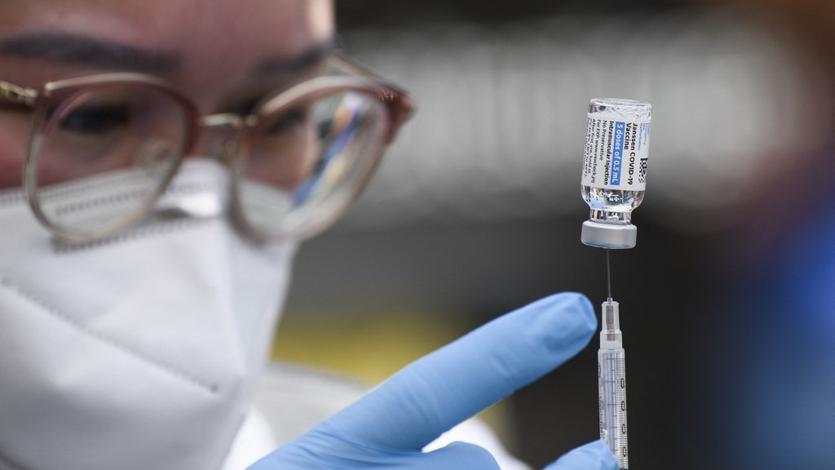 In this Aug 7, 2021 photo, a dose of the Johnson and Johnson COVID-19 vaccine is prepared at a mobile vaccination clinic at the Weingart East Los Angeles YMCA in Los Angeles, California. (Patrick T FALLON / AFP)
In this Aug 7, 2021 photo, a dose of the Johnson and Johnson COVID-19 vaccine is prepared at a mobile vaccination clinic at the Weingart East Los Angeles YMCA in Los Angeles, California. (Patrick T FALLON / AFP)
WASHINGTON / ADDIS ABABA / TBILISI / TUNIS / BERLIN / RABAT - A booster dose of Johnson & Johnson’s COVID-19 vaccine provided 100 percent protection against severe disease when given two months after the first inoculation, according to widely anticipated data that suggests it increases the potency of the one-time shot.
The booster was 94 percent effective at preventing symptomatic infections in the US portion of the Phase III trial, and 75 percent effective overall when it was given 56 days after the initial dose, the company said in a statement. A second study found the additional shot spurred a 12-fold increase in production of antibodies against COVID-19 when it was given six months after the first.
The results come as many developed nations turn to booster shots to address waning protection from some vaccines and the rise of the more infectious delta variant, which is sparking new outbreaks globally. The move has raised questions about the level of protection afforded by the existing shots and the equitable distribution of the vaccines now available.
“Our single-shot vaccine generates strong immune responses and long-lasting immune memory,” Mathai Mammen, global head of research and development for Johnson & Johnson’s Janssen drug unit, said in the statement. “When a booster of the Johnson & Johnson COVID-19 vaccine is given, the strength of protection against COVID-19 further increases.”
The time period between the initial vaccine and the booster shot was significant, the research showed. When the second dose was given two months after the first shot, it triggered a four-to-six fold increase in antibody levels — less than the 12-fold gain seen when it was given six months after the initial injection.
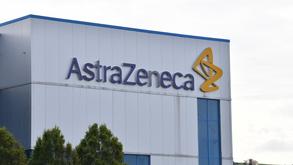 This photo shows a general view of the offices of British-Swedish multinational pharmaceutical and biopharmaceutical company AstraZeneca PLC in Macclesfield, Cheshire on July 21, 2020. (PAUL ELLIS / AFP)
This photo shows a general view of the offices of British-Swedish multinational pharmaceutical and biopharmaceutical company AstraZeneca PLC in Macclesfield, Cheshire on July 21, 2020. (PAUL ELLIS / AFP)
AstraZeneca
AstraZeneca Plc will invest US$360 million building a new manufacturing facility for small molecules in Dublin, dashing UK hopes that the drugmaker would develop the site at home.
The plant will ensure that AstraZeneca ’s global supply network can meet the needs of its pipeline of new medicines, the company said in a statement on Tuesday. The facility will create 100 highly skilled jobs in the life sciences sector, offering a boost to the local economy.
The new site will add capacity to manufacture ingredients for a wide range of medicines, cutting costs and introducing more sustainable manufacturing processes, AstraZeneca said. Small molecules are the mainstay of pharmaceutical drugs and lately have been used in new ways to help target cancer in treatments such as the company’s Enhertu.
The deal will “nurture the country’s life sciences sector and allow for the development of high value-added medicines,” according to Chief Executive Officer Pascal Soriot.
Earlier this week AstraZeneca said that Enhertu, which combines a small molecule with an antibody, reduced the risk of breast-cancer disease progression or death by 72 percent compared with Roche Holding AG’s Kadcyla - another antibody-drug conjugate.
The new AstraZeneca facility will be located at the 41-acre Alexion campus in College Park, Dublin.
The announcement comes only a few days after the UK government said it would rely on vaccines from Pfizer Inc and Moderna Inc for its COVID-19 booster program, sidelining the homegrown shot from AstraZeneca.
While the company was one of the first drugmakers to help develop a vaccine in the pandemic, it has grappled with safety concerns over potential side effects such as blood clotting.
AstraZeneca’s decision to locate the new facility in Dublin follows the completion of the US$39 billion takeover of Alexion, a specialist in rare diseases, earlier this year. It also is the outcome of months of detailed negotiations with the Irish government, which has worked to turn Ireland, a low-tax haven for corporations, into a world hub for life sciences.
News that AstraZeneca has chosen Ireland will be a blow to the UK post-Brexit, although the pharma giant did plow 380 million pounds (US$519 million) into creating a new manufacturing and packing facility for its oncology medicine Zoladex in Macclesfield, in the north of England.
UK Prime Minister Boris Johnson visited the Macclesfield campus, which employs more than 3,000 people, in April and said it would help propel the country’s ambitions to become a “global life-science superpower.”
Africa
The number of confirmed COVID-19 cases in Africa reached 8,158,654 as of Monday evening, the Africa Centers for Disease Control and Prevention (Africa CDC) said.
The Africa CDC, the specialized healthcare agency of the African Union, said the death toll from the pandemic across the continent stands at 206,499.
ALSO READ: World leaders return to UN with focus on pandemic, climate
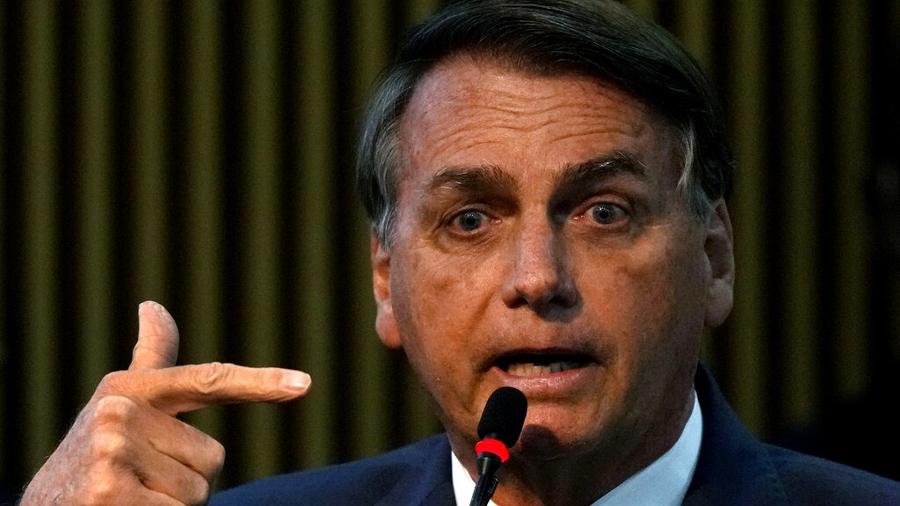 Brazil's President Jair Bolsonaro speaks during a ceremony at the Ministry of Citizenship, in Brasilia, Brazil, Aug 2, 2021. (ERALDO PERES / AP)
Brazil's President Jair Bolsonaro speaks during a ceremony at the Ministry of Citizenship, in Brasilia, Brazil, Aug 2, 2021. (ERALDO PERES / AP)
Brazil
A member of Brazilian President Jair Bolsonaro’s delegation to the United Nations was put in isolation after testing positive for COVID-19 in New York, adding to concerns that the general assembly this week could trigger a spike in coronavirus cases in the host city.
The diplomat, part of a mission that preceded Bolsonaro’s arrival, had tested negative before leaving Brazil, according to a person familiar with the situation at the Brazilian foreign ministry. The person, who requested anonymity and isn’t authorized to discuss the matter in public, said the diplomat didn’t have contact with president.
Brazil’s foreign ministry is now tracking dozens of people with whom the person has been in touch in New York, the Brazilian press reported, citing unnamed diplomatic sources. Bolsonaro himself has refused to get a Covid shot, saying he still has antibodies from a previous infection last year.
Bolsonaro is the only leader of a member of the major economies that comprise the Group of 20 nations who hasn’t been vaccinated. Bolsonaro’s office and Brazil’s foreign ministry didn’t respond to requests for comment.
The possibility that foreign diplomats visiting New York this week could arrive infected became source of friction between New York officials and the UN.
Penny Abeywardena, the city’s International Affairs Commissioner, wrote a letter to the UN General Assembly president noting that under New York rules, proof of vaccination should be required for entering UN headquarters.
But UN Chief Antonio Guterres told Bloomberg in an interview that an honor system will be used, meaning diplomats who swipe into the building are attesting to having been vaccinated.
Ethiopia
Ethiopia registered 737 new COVID-19 cases in the past 24 hours, taking the nationwide tally to 333,698 as of Monday evening, the health ministry said.
Meanwhile, 34 new coronavirus-related deaths and 1,101 more recoveries were reported, bringing the national death toll to 5,164 and total recoveries to 301,785, the ministry said.
Georgia
Georgia on Monday reported 662 new COVID-19 cases, taking its total to 595,926, according to the country's center for disease control.
Data from the National Center for Disease Control and Public Health showed that 3,534 more patients have recovered in the past 24 hours, taking the total number of recoveries to 563,530.
Meanwhile, 34 people died in the last 24 hours, raising the death toll to 8,575.
Global tally
Coronavirus cases worldwide surpassed 229.13 million while the global death toll topped 4.70 million, according to data compiled by Johns Hopkins University.
 In this file photo taken on Aug 03, 2021, a mother and her 12-years-old twin girls watch an information video prior to the vaccination of the young girls with the BioNTech vaccine at the district vaccination center in Ludwigsburg, southern Germany, amid the ongoing COVID-19 pandemic. (THOMAS KIENZLE / AFP)
In this file photo taken on Aug 03, 2021, a mother and her 12-years-old twin girls watch an information video prior to the vaccination of the young girls with the BioNTech vaccine at the district vaccination center in Ludwigsburg, southern Germany, amid the ongoing COVID-19 pandemic. (THOMAS KIENZLE / AFP)
Germany
Germany would likely offer COVID-19 vaccines to children under 12 in early 2022, Federal Minister of Health Jens Spahn said on Monday.
Spahn said he expected authorization to use the vaccine in this age group to come in the first quarter of next year. "Then we could also protect the younger ones even better," he told the newspapers of the Funke Mediengruppe.
As of Monday, more than 52.5 million people in Germany have been fully vaccinated against COVID-19, bringing the country's vaccination rate to 63.1 percent, according to the Robert Koch Institute (RKI) for infectious diseases. Almost 56 million people have received at least one vaccine dose.
Morocco
Morocco announced on Monday 693 new COVID-19 cases, taking the tally of infections in the North African country to 920,374.
The death toll rose to 13,958 with 48 new fatalities, while 1,415 people were in intensive care units, it said.
ALSO READ: Moderna sees progress in its hybrid booster shots
Poland
Poland will recommend a booster dose of the COVID-19 vaccine for people over 50 as well as healthcare workers, a deputy health minister said on Tuesday.
Waldemar Kraska said the booster would be administered at least 6 months after the second shot. A third dose was already recommended earlier for the immuno-compromised.
Tunisia
Tunisian Ministry of Health reported on Monday 472 new COVID-19 cases, raising the number of cases in the North African country to 700,400.
The death toll from the pandemic rose by 17 to 24,527, while the number of recoveries reached 669,928, the ministry said in a statement.
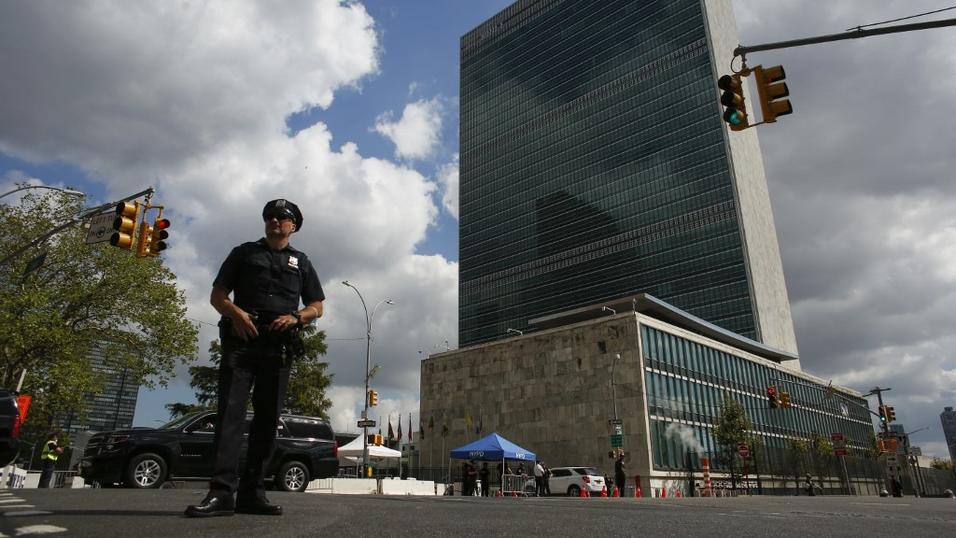 A police officer stands guard outside the UN headquarters during the high-level 76th session of the UN General Assembly taking place on Sept 20, 2021 in New York. (KENA BETANCUR / AFP)
A police officer stands guard outside the UN headquarters during the high-level 76th session of the UN General Assembly taking place on Sept 20, 2021 in New York. (KENA BETANCUR / AFP)
UN General Assembly
In a new take on vaccine diplomacy, a free mobile COVID-19 testing and vaccination station is welcoming world leaders and delegates at this week's UN General Assembly, seeking to avoid a super-spreader event.
After a virtual meeting last year, about a third of the 193 UN states are planning to again send videos, but presidents, prime ministers and foreign ministers for the remainder are due to travel to the United States.
New York City has parked a pink, yellow and blue bus that serves as a mobile clinic outside the UN venue and is offering free tests and Johnson & Johnson vaccines to attendees all week from 7 am to 11 pm.
US Ambassador to the United Nations Linda Thomas-Greenfield got tested on Monday and urged those attending the General Assembly to get a free test or vaccination.
Attendees should do "everything possible to mitigate against getting COVID-19 so that this event does not become a super-spreader event," Thomas-Greenfield told reporters.
The United States tried to dissuade leaders from coming to New York as a COVID-19 precaution although President Joe Biden will participate in person, his first UN visit since taking office.
The UN requires participants to wear masks and be vaccinated. But it relies on an honor system that means anyone entering the assembly hall effectively declares they are vaccinated. They do not have to show proof.
The UN site provided more than 80 tests and six vaccinations by Monday mid-afternoon, Adam Shrier, press secretary for New York City's test and trace corps, said.
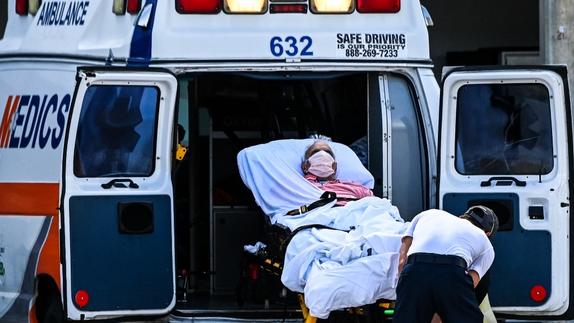 Medics transfer a patient on a stretcher from an ambulance outside of Emergency at Coral Gables Hospital where Coronavirus patients are treated in Coral Gables near Miami, on Aug 16, 2021. (CHANDAN KHANNA / AFP)
Medics transfer a patient on a stretcher from an ambulance outside of Emergency at Coral Gables Hospital where Coronavirus patients are treated in Coral Gables near Miami, on Aug 16, 2021. (CHANDAN KHANNA / AFP)
United States
Under new US rules, foreign nationals admitted to the United States on humanitarian grounds, who are not required to have COVID-19 vaccinations, will have to agree to be vaccinated upon arrival, according to a planning document seen by Reuters.
The White House on Monday said it would lift restrictions that bar many non-US citizens from traveling to the United States by air starting in November. The United States will require nearly all foreign nationals age 12 and over to show proof of COVID-19 vaccines before entering the country.
Exemptions to that policy will include "children, COVID-19 vaccine clinical trial participants and humanitarian exceptions for people traveling for an important reason and who lack access to vaccination in a timely manner," the planning document said.
Most people who receive those "very limited" exemptions would be required to agree to get vaccinated upon arrival, the document said. It was not immediately clear how or where vaccines would be administered or if the travelers would have to quarantine while waiting for their immunity to build.
A White House official said the administration is still working on the rules that will govern exemptions and added those traveling under humanitarian exemptions "will also need a compelling reason to come to the (United States)."
"To the extent there are people fleeing sort of exigent circumstances, violent conflict ... that is something we'll consider" when granting a humanitarian exemption, a White House official said.
The document said the Department of Homeland Security, Federal Aviation Administration and State Department will work "to develop the directives and processes for implementing these changes via the boarding process with airlines and through consular affairs offices."
An administration official said policies about religious exemptions will be decided during that process.


